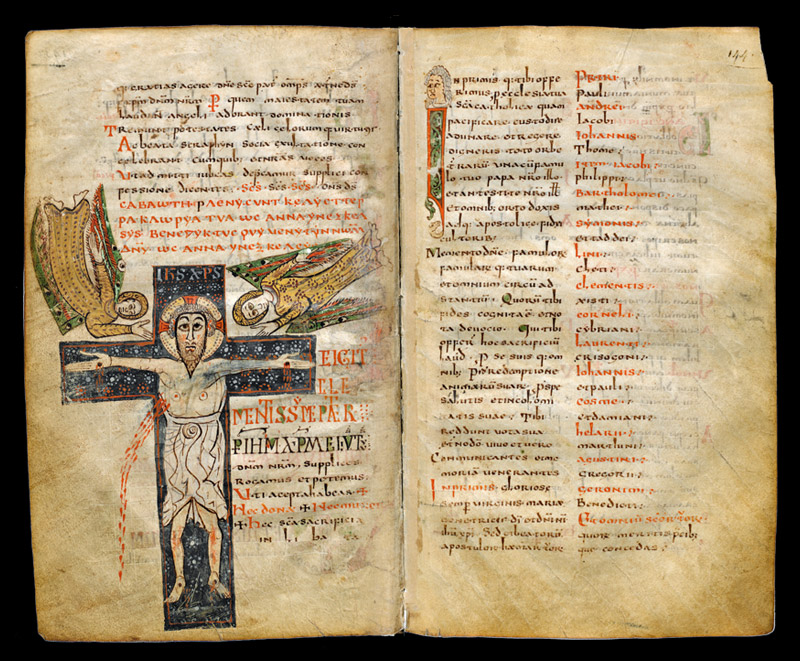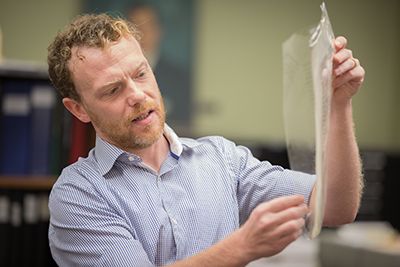Manuscript

Gellone Sacramentary (c. 800). Paris, Bibliothèque Nationale de France, Cod. Lat. 12048, fol. 143 verso and fol. 144 recto. Courtesy Bibliothèque Nationale de France.
MANUSCRIPT/HNRC4013H
MONDAYS, 2-4:50p.m., SPRING 2018
Until the invention of the printing press in the mid-fifteenth century, all writing in the west was written (-script) by hand (manu-). If you wanted a copy of a book, you had to copy it yourself or have somebody copy it for you. If you wrote a poem, treatise, chronicle, or any other work, once it left your hands, you had no control over it; its form was fundamentally unstable. A scribe could copy it poorly, choose to excerpt it, pair your text with one you hated, or insert their own “improvements.” Textual drift, variance, and the various interventions of readers made sure that no two copies of a work could ever be exactly the same.
In addition to examining manuscripts from our library’s Special Collections, this course will examine the theoretical differences between manuscript and print culture. We will learn how manuscripts were made, using clay, papyrus, and animal skin, as well as how pre-modern books were bound together. We will also take a cross-cultural look at manuscript and print culture outside of the west. Finally, we will examine modern manuscripts, such as the drafts and notes of authors.
Some of the main questions driving this course are:
- Is the modern desire for a pure text (e.g. that of the Bible) anachronistic, since no two copies were alike until the printing press?
- How does the relationship between author and reader change in manuscript culture, when readers could, and did, make significant changes to texts?
- Is the rise of internet culture in some ways a return to manuscript culture?
- Has the role of the printing press been exaggerated? What actually changed after its invention?
- How do different technologies affect reading? Is reading on a Kindle a fundamentally difference experience from a medieval book?
"Manuscript" and "Internet" both consider how technology mediates our experience of reading, writing, and evaluating information.
Course Credit:
- All students: Three hours of honors credit
- English major and minor: Upper-level elective
- Medieval and Renaissance Studies minor: Upper-level elective toward minor
- Fulbright Honors: College Honors Humanities Colloquium requirement
About Joshua Byron Smith:
 Joshua Byron Smith, assistant professor of English and director of the Medieval and Renaissance Studies Program, will teach the course. His research focuses on the multilingual literature of medieval
Britain, especially Anglo-Welsh literary exchange. Smith received a prestigious, three-year
Scholars of Critical Bibliography Fellowship from the Mellon Foundation in 2015, which
provided seed money for the recent Bible Craft symposium and the 2016 Mellon Symposium
on Manuscripts and Rare Books, both hosted in the Honors College wing of Gearhart
Hall. His book Walter Map and the Matter of Britain is available from the University of Pennsylvania Press.
Joshua Byron Smith, assistant professor of English and director of the Medieval and Renaissance Studies Program, will teach the course. His research focuses on the multilingual literature of medieval
Britain, especially Anglo-Welsh literary exchange. Smith received a prestigious, three-year
Scholars of Critical Bibliography Fellowship from the Mellon Foundation in 2015, which
provided seed money for the recent Bible Craft symposium and the 2016 Mellon Symposium
on Manuscripts and Rare Books, both hosted in the Honors College wing of Gearhart
Hall. His book Walter Map and the Matter of Britain is available from the University of Pennsylvania Press.